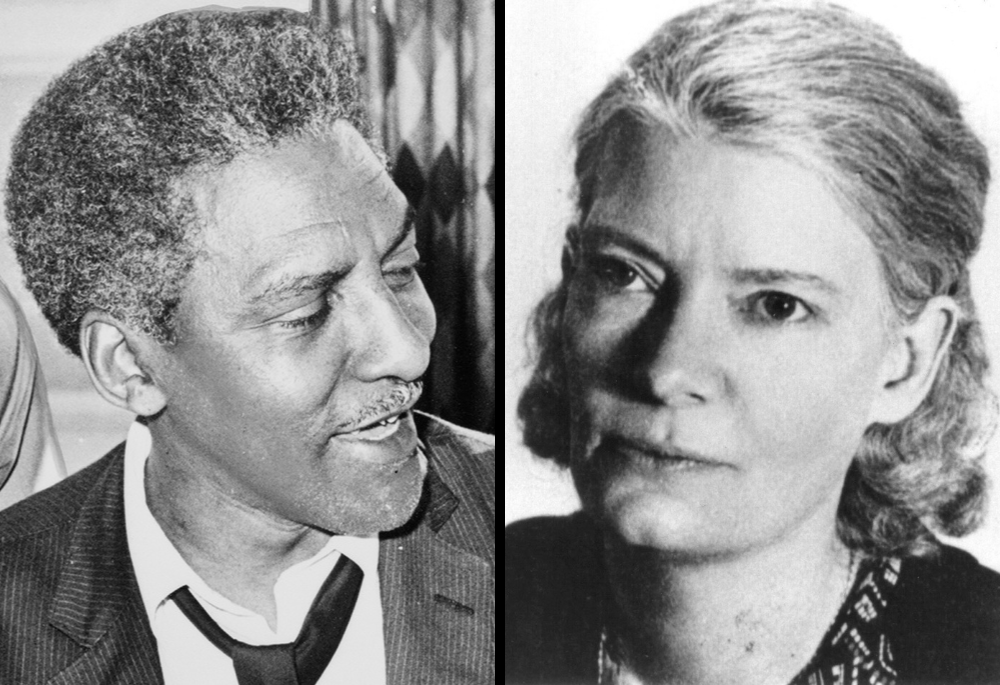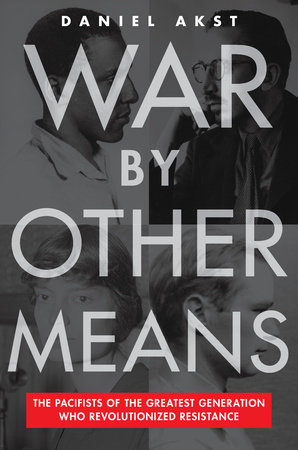
Bayard Rustin, left, is pictured in 1964; Dorothy Day is seen in a 1935 file photo. (Library of Congress/World Telegram & Sun photo/Ed Ford; CNS/Courtesy of Marquette University Archives)
I first encountered the Catholic Worker movement, its co-founder Dorothy Day and the concept of pacifism through Day's autobiography, The Long Loneliness, as a young 20-something in early 2013 — and I came alive.
In the book and in Day's many writings for the Catholic Worker newspaper, a publication started by Day in the 1930s and continuing today, I found the words to put to my heart's deepest convictions. At that time in my life I was spiritually confused, struggling to find people of the Christian faith that were living lives I felt truly reflected the teachings of Jesus. Day's vision of radical love, personalism and nonviolence — and the way she genuinely lived out this vision — ushered me into a new chapter of my own spirituality and radicalized my relationship to the life and teachings of Jesus.
That commitment to nonviolence has continued to inform my life ever since: through actions of civil disobedience, in my speech and in relationship to myself and to the human and nonhuman world. Day's words and life call us to bravery by speaking out against the injustices in this world, whether or not we are welcomed with open arms for our convictions. This call is equally present in the stories of the other protagonists that readers will meet in Daniel Akst's new book, War by Other Means: The Pacifists of the Greatest Generation Who Revolutionized Resistance.

In this unique work, Akst tells the compelling tale of the few Americans who remained pacifists through the duration of World War II. He features big names like Dorothy Day, Bayard Rustin, David Dellinger and Dwight Macdonald, but readers learn the stories of many inspiring others along the way, whose shared traits, according to Akst, are "asceticism, strength of soul, a concern with moral purity, and a great tenderness toward one's fellow humans." These characteristics, in combination with Akst's account, present a motley crew of endearing activists whose stories reflect a pure idealism put into practical action.
An assumption about the pacifists of the World War II era (and beyond), is that they isolated themselves from the world, turned a blind eye to global issues, deserted their country and were traitors. War by Other Means shows a group of committed activists doing exactly the opposite: tirelessly working to fight the injustices they witnessed in the world while remaining true to their consciences by living into a nonviolent ethic.
Advertisement
Akst handles a potentially controversial topic gracefully. With a historian's curiosity, he describes his characters' activism before and during the war, and how the development of their pacifist ethic during this time influenced their work for social justice long after. The "war by other means" named in this book's title refers to these activists' use of pacifist techniques as nonviolent weapons in the war against the many social injustices of the time, including the use of nuclear weapons, conscription, racism and segregation.
Dorothy Day published statements in The Catholic Worker paper throughout the war condemning conscription as a "road leading straight to militarism, imperialism and ultimately to American fascism and war" and appealing to her Catholic readers that "my absolute pacifism stems purely from the gospel." Statements such as these lost the paper over 100,000 readers, but Dorothy bravely kept her stance while continuing to manage the Catholic Worker house that was feeding and housing much of New York's homeless and hungry population and working to expand workers' rights all over the nation.
Bayard Rustin spent much of the war in Civilian Public Service camps and federal prisons for refusing to sign up for the draft, and worked tirelessly with other conscientious objectors to desegregate the prison system through the use of nonviolent techniques, including hunger strikes, work strikes and sit-ins. After the war, he chose civil rights work as his highest priority and eventually served as one of Martin Luther King Jr.'s most trusted advisers, most especially on the ethics and practical use of Gandhian nonviolence. Of the four main characters in War by Other Means, Rustin was the only person of color and was also openly gay in a time period when to be both of these was truly life-threatening. In this light, his story and bravery feel especially compelling.
David Dellinger first gained notoriety as a pacifist by publicly refusing to sign up for the draft with a group of seven other people. Like Rustin, Dellinger spent much of the war in Civilian Public Service camps and federal prisons, working to desegregate the prison system. He went on to become one of the leaders in the protest against nuclear war after the U.S. bombed Hiroshima and Nagasaki at the end of World War II — and again publicly refused to sign up for the draft during the Vietnam War. He was an inspiring figure for the young activists coming up amid the counterculture movement of the 1960s and '70s.
Reading the accounts of these and other brave souls helped me reach a more holistic understanding of the greater spiritual movement I have chosen to be a part of as a Catholic Worker and a practitioner of nonviolence.
Dwight Macdonald greatly influenced American public thought during World War II through his antiwar magazine, politics (stylized lowercase), which featured pieces concerning the rights of conscientious objectors, African Americans and gay people. His magazine met unexpected levels of popularity and became a forum for the radical left of America, spreading news and inseminating ideas to a wide-reaching audience.
Reading the accounts of these and other brave souls helped me reach a more holistic understanding of the greater spiritual movement I have chosen to be a part of as a Catholic Worker and a practitioner of nonviolence. Akst's stories bring me renewed life and interest in nonviolent campaigns and in the history of a movement that breathes into my life daily. His well-researched and detailed way of writing keeps readers' interest piqued. He speaks with admiration of the unwavering courage of the book's main characters, not aiming "to make the case for absolute pacifism but to tell the story of its remarkable adherents during its greatest trial: the second World War."
War by Other Means is a valuable piece of nonfiction, shedding light on a small but strong group of people whose activism is mostly overlooked in the study of World War II, but who were, in Akst's words, a "tiny current — which somehow became a tsunami of social change."







